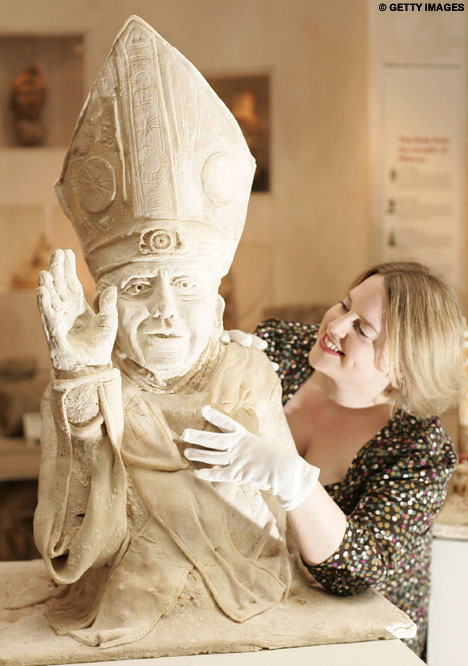They are the majority of worshipers every Sunday (and through the week), and they make up some 80 percent of the more than 30,000 lay ministers (and growing fast) serving in the nation’s 19,000 parishes. There are more of them working in U.S. churches than there are priests. They distribute communion, raise the next generation in the faith, and younger versions of themselves serve as altar girls. Yes, they are Catholic women. And yes, they were nearly invisible during last week’s Pope-a-palooza.
Benedict got an eyeful of the American church while he was here, but not from up close. No women were allowed to distribute communion (nor lay people for that matter–only ordained dudes) nor were any girls allowed as altar servers. In fact, the liturgies that American Catholics are used to, with women and girls playing important roles, had to be re-gendered for the papal masses. Now many people will see this as just so much whining by wannabe women priests. But the reality is that women, especially lay women, make the church run “on the ground.” This has some critics fearing a “feminization” of the church.
Yet it is simply the reality that was not acknowledged or even discussed last week. And it is one of those realities that we are left to grapple with as we move beyond the visit by the pope.
Fortunately, we have Catholic women (and men) who are not only serving in parishes but also dedicating their lives and hearts and minds to this topic. For their thoughts, a good start would be this powerful essay by Phyllis Zagano from Hofstra University. Zagano is a Catholic and the author of several books and she is thoroughly grounded in tradition. And from that grounding argues, among other things, that women could be ordained deacons–at least.
“Can all this change? Will the next pope — or the next, or the next — be greeted by women seminarians, or deacons, or priests, or even bishops? Despite protestations to the contrary, neither 1976 nor 1994 produced an infallible “ex cathedra” declaration by the pope, or an infallible teaching of an ecumenical council. Catholic canon law holds nothing is infallible unless it is clearly stated as such.”
Valerie Schultz is a free-lance writer and contibutor to the Jesuit weekly, America. She has a post at America’s blog in which she expresses gratitude for the pope’s visit but asks for a hearing for her gender:
“I want the Pope to know that we women, who largely take care of the daily business of church, are becoming weary of hoping that the men will come around. We know that Jesus sees us as equal to men in devotion and capability, but we know that the hierarchy of the earthly church of Jesus does not. We are tired of being denied one of the sacraments because we lack male sex organs, and we are even more tired of scandals brought on by those same unruly organs. It seems to many of us that the critical shortage of priests might be alleviated by admitting the possibility of priestly vocation in the hearts of the roughly 50% of Catholics who are not male.”
Finally, for those looking for a longer but very accessible treatment of the topic–and from a man, and a priest–check out an essay in Commonweal, “Why Not? Scripture, History & Women’s Ordination,” in the April 11, 2008 edition. Egan’s in-depth treatment is masterful, and defies easy summary. (It is behind the magazine’s firewall, but consider forking over just $25 for an on-line subscription–this essay alone is worth the price of admission.)
As Egan writes:
“To question this exclusion does not require that we conclude all gender roles are inconsequential. Gender roles are different in different cultures and in different historical periods. To what extent they are socially constructed or are rooted in natural sex differences is difficult to determine. Through most of recorded history, in most cultures, women were subordinated to men; today we believe men and women are essentially equal. Throughout most of its history, the church reflected this subordinated view of women; now it does not.
The church cannot remain exempt from the principles of its own social teaching. Catholics cannot bear witness to principles of justice, equality, subsidiarity, and participation, and claim exceptions for themselves. The question is this: Has the tradition of excluding women from the diaconate, presbyterate, and episcopacy really been faithful to the teaching and practice of Jesus? Or has it been part of a mostly unexamined and partially unconscious bias for subjecting women to men’s authority and power? Which is the more believable interpretation of our history as a people?
This is a very important question, one that urgently needs and deserves an open, prayerful, learned, patient, and discerning conversation among Catholics today.
And yet it does not happen. And so the crisis deepens.”

